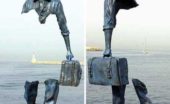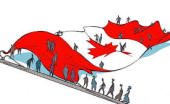Johannah Bernstein post: "eternally proud of my father’s extraordinary aeronautical engineering. legacy. here is a photo of the Canadair Water…
Canada — Immigration & citizenship 2016
Written by Diana Thebaud Nicholson // November 4, 2016 // Canada, Immigration/migration // Comments Off on Canada — Immigration & citizenship 2016
This slightly whimsical piece from Maclean’s also gives some useful pointers about the selection process for immigrants
Sorry Americans, you’re just not our type
Thinking of moving to Canada to escape President Trump? Odds are you’re not educated, young or employable enough to get in.
We really like newcomers, generally speaking. Canada takes in 250,000 annually, and this year has welcomed Syrian refugees by the planeload (or, as your Republican nominee says, by the Trojan horse load). But we can be a picky lot, and most of you need not apply.
The median American adult is about in his or her mid-40s, and has not completed a college degree. Based on the criteria to enter the country as an economic immigrant—that is, not as a refugee or a Canadian’s relative—those are two strikes against you. If you are not applying to migrate with a Canadian job already lined up in a field where there’s a domestic skills shortage, that’s more or less strike three.
In 2015, Canada opened an express-entry qualification system, with an average processing time of six months before a permanent residency is approved. It’s based on a point system. Maclean’s tested how that typical 46-year-old American would fare if he or she never finished college, but has been working steadily for several years. That person gets 114 points out of 1,200. You won’t have a chance without a point score well in the 400s, says Zool Suleman, a Vancouver-based immigration lawyer.
“You are miles ahead if you can bring refugees in supported by our own citizens. Then they have a base from which to go. They have a welcome, rather than having refugees come in uninvited or illegally or alone” – Immigration Minister John McCallum
20 September
Canada’s Private Refugee Sponsorship Program To Expand Around The World
Research has demonstrated that privately sponsored refugees tend to have relatively early, positive integration and better settlement outcomes, the government noted in a press release.
(HuffPost) The initiative between the Government of Canada, the United Nations High Commissioner for Refugees and Soros’ Open Society Foundations is at its infancy. Details, including funding arrangements, will be decided at a meeting in Ottawa in December.
The funds pledged were not a “gargantuan amount,” McCallum said, not “hundreds of millions of dollars” but more than $10 million.
The initiative, according to the government’s press release, would:
Expand the use of private sponsorship as a pathway for refugees
Encourage the expansion of resettlement by building the capacity of states, civil society groups and private citizens to launch private sponsorship programs
Mobilize citizens to directly support refugees and encourage “a broader political debate that is supportive of refugee protection.”
Under the government plan to resettle 25,000 Syrians by early this year, nearly 9,000 were privately sponsored and another 2,000 were sponsored by a program that blends private and government support.
The program set a cap of private sponsorships allowed per year. It allows people to sponsor a refugee for $12,600, which includes help with income and initial costs like groceries and rent.
19 September
Canada to join with UN, George Soros to export private refugee sponsorship
Some 13 countries interested in adopting program, Immigration Minister John McCallum says
(CBC) Canada is forming a partnership with the United Nations and billionaire George Soros to help other countries implement their own version of Canada’s private refugee sponsorship program.
15 September
Canadians cannot be overly impatient with integration of immigrants, Justin Trudeau says
Prime minister makes comments during panel discussion with London mayor at 2016 Global Progress conference
The prime minister was taking part in a day-long conference hosted by Canada 2020, which describes itself as a progressive think-tank.
Asked by the panel moderator what can be done to reduce fear of and discrimination against newcomers, Trudeau replied that what’s happening in Canada and around the world is “nothing new.”
13 August
John McCallum wants to ‘substantially increase’ immigration to fill Canada’s labour needs
Canada’s immigration minister points to an aging population and looming labour shortages
Earlier in the week, McCallum was in Beijing, where he sought to open more offices where Chinese can apply for visas, in the hope of attracting more high-skilled workers.
The Trudeau government is already seeking to admit between 280,000 and 305,000 new permanent residents in 2016 — a record increase from the 260,000 to 285,000 newcomers the previous Conservative government had planned to welcome by the end of 2015.
Key to the Liberal government’s larger plan to promote innovation and grow the economy is McCallum’s three-year immigration plan, which he intends to unveil this fall.
14 January
Express entry, foreign worker reforms attract ‘fewer’ skilled workers: chamber report
Immigration reforms made it difficult for businesses to attract high-skilled workers, chamber of commerce says
Canada risks losing its competitive edge because of immigration reforms brought in under the previous Conservative government for political expediency, says a new report by the Canadian Chamber of Commerce.
The report is critical of the Express Entry immigration system launched one year ago and reforms to the Temporary Foreign Worker Program made in June 2014 following a series of stories published by CBC’s Go Public team alleging abuse of the program.
The chamber calls on the federal government to conduct an immediate review before things get worse.
- Express entry gives first dibs to temporary foreign workers
- Temporary Foreign Worker Program: ‘Stiff’ new penalties coming Dec. 1
- Read more of CBC’s coverage of Express Entry
12 January
How to avoid ‘immigration by lottery’ in Canada
Immigration lawyer Reis Pagtakhan argues for adjusting express entry system
Last week, Immigration Minister John McCallum announced an increase to the number of applications the Canadian government would accept from parents and grandparents of Canadians who want to immigrate to Canada.
The increase from 5,000 to 10,000 applications per year fulfills a Liberal campaign promise.
However, with over 14,000 applications arriving within the first four days of the program in 2016, raising the cap will still leave a lot of disappointed Canadians.


